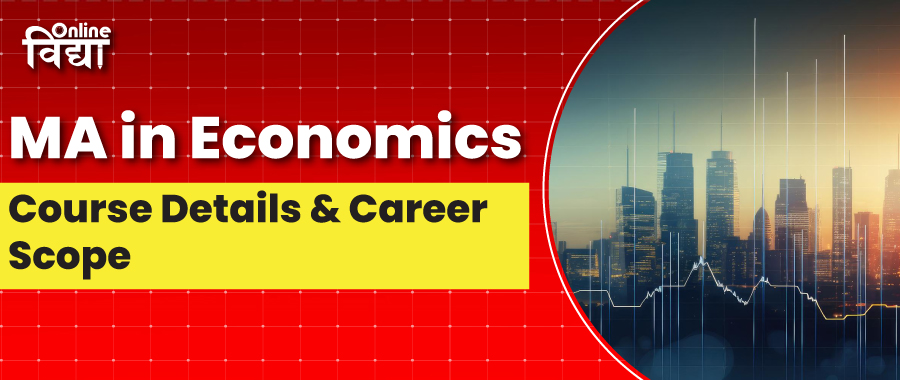Specializations
Courses Available
Courses

MA in Economics: Course Details & Career Scope
MA in Economics: Course Details & Career Scope,Apr 12, 2025
Online MA
Apr 12, 2025
1631 Views
- Share:
Master of Arts in Economics or M.A. (Economics) is a 2-year post-graduate course that offers a thorough understanding of financial and management fields and enhances a student's skill so that they are capable enough to face any challenge in the field. The course provides students with the latest concepts of economic theory through experiential learning through internships, workshops, seminars, and other activities.
The curriculum for this program was created with the latest research work in mind, basing some of the most thrilling subjects of research. It typically involves the course study of economic theory concepts, microeconomics and macroeconomics, financial systems, international economics, etc.
Course Highlights
Particulars | Details |
Course Level | Postgraduate |
Course Duration | 2 years |
Course Eligibility Criteria | Bachelor’s degree from a recognized university. |
Course Fee Range | INR 50,000 to INR 15 Lakh Per Annum |
Examinations Type | Semester type |
Job Profiles | Program Manager, Financial Analyst, Investment Banker, Policy Analyst, Business Strategist, etc. |
Average Salary Range | INR 4 to 20 LPA |
Top Recruiters | Boston Consulting Services, Deloitte Consulting Services, JP Morgan, KPMG, etc. |
Economic considerations affect every aspect of a nation, including people and businesses, government, and services. Graduates can work in the public or private sectors of finance, banking, and other disciplines.
Why do I need an MA in Economics?
This subject can be fun and rewarding to study. See the points below to find out how.
- MA Economics gives students a strong grip on the subject by educating them about the need to rise in demands and scarce resources to satisfy those demands.
- An MA in Economics can lead to more lucrative career prospects than other bachelor's degrees. Banking, academic, organizational, government, and investment sectors are all good career options for these graduates.
- Qualification provides the avenue to further studies to a PhD in the same field of study.
- Economists are considered to be of utmost importance since they are tasked with identifying persistent structural shifts in the market.
MA Economics Eligibility
The eligibility criteria for admission based on entrance tests and merit are different, but candidates seeking a master's degree in economics have to fulfill the MA Economics eligibility criteria given below.
- A bachelor's degree in economics or an allied branch of study.
- At least 50% at the graduate level.
Entrance Examinations:
- Common University Entrance Test for Postgraduation (CUET PG),
- University of Rajasthan Admission Test for Postgraduate Courses (URATPG),
- Indraprastha University Common Entrance Test (IPU CET),
- Jamia Millia Islamia Entrance Exam (JMI Entrance Exam)
Course Curriculum
Semester 1
Microeconomic Theory Introductory Mathematical Economics Introductory Econometrics International Trade | Semester 2
Macroeconomic Theory Theory of Pricing and Distribution International Finance Quantitative Methods |
Semester 3
Development Economics International Economics Econometrics-1 Industrial Economics (Electives) Environmental Economics (Electives) Globalization and Economics (Electives) | Semester 4
Public Economics Econometrics-2 Project Work Financial Economics (Electives) Economics of Infrastructure (Electives) Economic Demography (Electives) Economics and Law (Electives) |
MA Economics Job Prospects
Since this topic is heavily associated with finance, markets, and the overall working of an economy, MA Economics graduates with a good percentage are likely to become economists in both government and private sectors.
Below are the numerous possible MA Economics career profiles that degree holders can opt for.
Job Profiles | Average Salary Range |
Program Manager | INR 20 LPA |
Financial Analyst | INR 6 LPA |
Investment Banker | INR 11 LPA |
Policy Analyst | INR 4 LPA |
Business Strategist | INR 6 LPA |
Top Recruiters
Bain & Company | Boston Consulting Services | KPMF |
McKinsey & Company | Deloitte Consulting Services | JP Morgan |
EY-Parthenon | Morgan Stanley | CRISIL |
Scope of the Course
Learning is continuous, and if a person has the aptitude and inclination to learn more, pursuing a Ph.D. in Economics or any other such research subject might be attractive. To find the best university to study this course, you can freely visit this link: https://onlinevidyaa.com/counsellors
- PhD in Economics
- PhD (Business Economics)
- MPhil (Economics)
- PhD (Agriculture Economics)
Given the above, some courses you can continue after finishing the MA in Economics.
It is possible to pursue further studies by enrolling in the aforementioned courses in a bid to master the specializations of the topic as well as the subject in general. Pursuing further studies in MA Economics not only contributes to the acquisition of knowledge, but it also makes one eligible for high-paying jobs.
FAQs
Is an MA in economics worth it?
There are many reasons graduate study is desired by economics experts. Better salary, career development opportunities, and the chance to study and master certain skills are some of the benefits of attaining a master's in economics.
Are jobs available for an MA in Economics?
The degree holders in economics can work as financial analysts, investment bankers, policy analysts, or business strategists. An Economics course holder can expect an income of INR 8-15 LPA. Those students who get a degree of BA Economics could pursue a Master's degree in MA Economics.
Can I work on a PhD after having completed an MA in economics?
Applicants for PhD Economics should have completed their Master's degree. Those who have done a four-year Bachelor's degree (with one year research) can also apply for PhD in Economics provided they appear for UGC NET exam.

Meet Our Counselling Experts
Get 100% Free Career Counseling




PlacementPartners










Schedule Your 30 min Couselling Session With Today!!
Select a Date of your choice :
You Have Selected Slot on .

